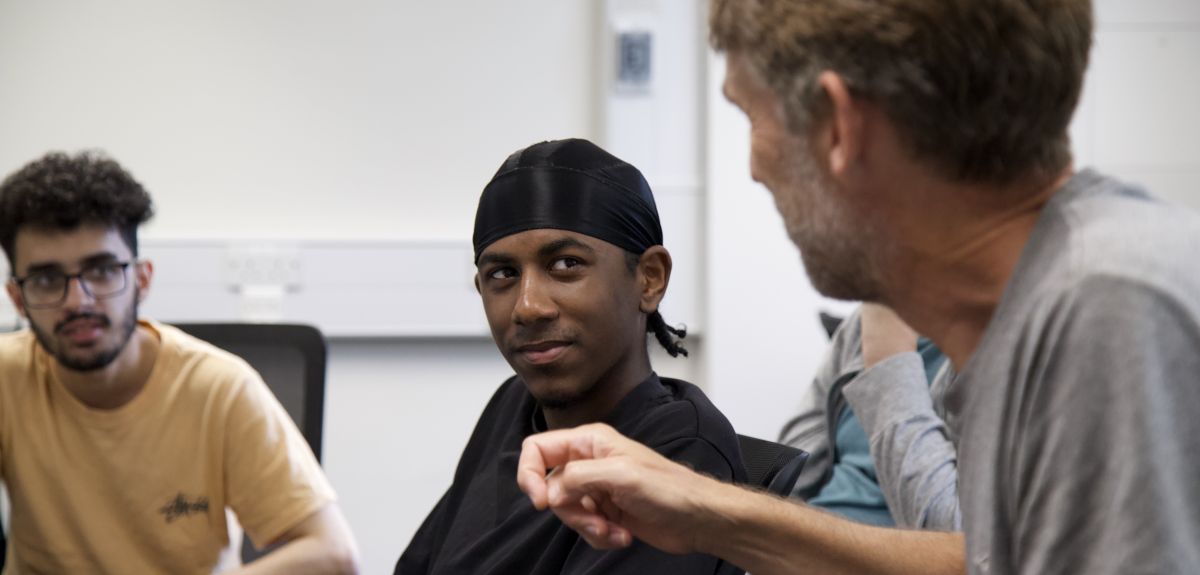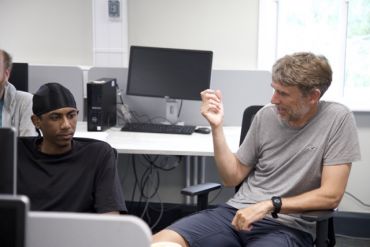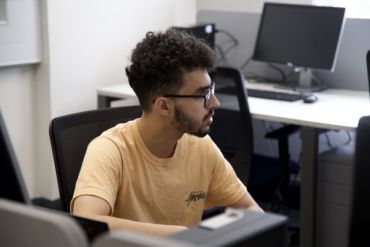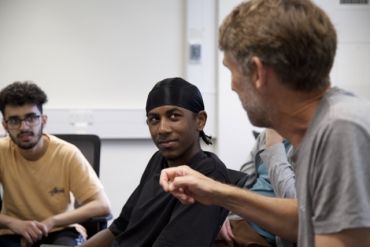
UNIQ+ experiences from Oxford's graduate research internship programme
This summer, 127 students from across the UK came to Oxford to participate in UNIQ+ - the university's flagship graduate access programme that provides students from underrepresented or disadvantaged backgrounds with the opportunity to experience life as a graduate research student. The 7-week programme sees students undertake a research project and attend training skills and information sessions, as well as meeting and working with Oxford researchers, academic staff, and graduate students.
Here we hear from UNIQ+ supervisor David Gavaghan, Professor of Computational Biology at Oxford, and his 2023 UNIQ+ interns, Talal and Kamil, to find out more about their experience of the programme.
Professor Gavaghan, can you tell us about your role at Oxford?
This is my 37th year at Oxford - I came in 1986. I came here for one year to do a master's degree and never quite escaped, although it’s quite a nice place to get stuck!
I particularly work with industry, so looking at how we can use computational biology to establish whether new drugs are likely to cause toxic side effects on the heart and the way that disease spreads, for instance during the Covid-19 pandemic. An academic project I have looks at whether we can engineer bacteria to produce hydrogen and oxygen from waste products which would help tackle climate change. A huge range of things, and what ties it all together is that the mathematics is pretty much identical for all of those things, surprisingly!
My main job these days is running the Doctoral Training Centre, which has four different programmes for DPhil students. We take around 100 students a year and we try and get them to work on problems in the life and natural sciences, with students coming from the complete range of science backgrounds.
How are you involved in UNIQ+?
I’m Chair of the Graduate Access Working Group at Oxford, which has been going for about four years now. One of its first initiatives was UNIQ+, to support underrepresented groups and socio-economically disadvantaged undergraduate students from the UK. This is our fourth iteration of the internship programme. We started with thirty-three students in 2019 and then Covid happened, so the second year was a scaled back digital programme and we had about 115 students. In 2021, we ran a mostly online internship programme, then in 2022 and 2023 we’ve been able to open the programme to 130 students.
You’ve also been supervising two UNIQ+ interns this summer. What have you been working on?  Professor Gavaghan and UNIQ+ 2023 intern Kamil
Professor Gavaghan and UNIQ+ 2023 intern Kamil
What do you enjoy most about being a supervisor?
Getting to interact with the students. They’re so enthusiastic, they’re enjoying being in Oxford, they’re working hard and clearly getting a lot out of it. The point about UNIQ+ is that students who are under-represented in graduate study at Oxford come here and discover that it’s just like any other university. It’s just a really good university and a great place to study. That’s the thing I like best about it. One of the goals is that everyone who has the potential to succeed here considers it as somewhere they might go.
Do participants tend to go on to graduate study?
It varies from year to year. It is certainly making them think hard about whether they want to do graduate study, and that’s one of the interesting things - if they’ve already got a job - whether they’ll come back later and do graduate study having done this. It might put it in their heads.
Before arriving in Oxford for UNIQ+ Kamil had been at UCL studying Computer Science, and Talal had been studying Discrete Mathematics (Maths and Computer Science) for his undergraduate degree at Warwick University.
 UNIQ+ 2023 intern Talal
UNIQ+ 2023 intern Talal
Talal: No, this is actually the first time. I think I visited Oxford when I was quite young on a year 9 or 10 trip, but this is the first time I've come to Oxford by myself and explored the city.
Kamil: I was born and raised in Northampton, so not far from here. I did the undergraduate UNIQ programme at Oxford before going to university and that's one of the reasons I applied for this because it seemed like that natural progression.
Could you tell us a bit about the research you've been doing over the last seven weeks?
Talal: The first week was training. The thing I really enjoyed was that it was structured in a way that if you wanted to do the more advanced topics, if you were comfortable with the easier topics, you could go ahead and do that. Then after that we pretty much got straight into the research.
Usually you have information and from that you produce data, but in our project we were given the data and we're essentially going backwards to produce the information. So for the bubonic plague that would be trying to find out what the contraction rate was for the plague, the average life expectancy, the mortality rate.
Kamil: The project was to understand the problems faced by people doing statistical inference for the first time, so we were kind of thrown in at the deep end and left to work it out for ourselves. So there was a lot of trial and error, and just trying things out. We got better at recognising what does work and going in the right direction. Now I see why a lot of the things we tried didn’t work!
Why computational biology? What was it about this study area that you were interested in?
Talal: I really wanted to get into something that had a machine learning aspect to it because I have a general interest in that. All the projects that I've done have really just been focused on pure computer science and mathematics and I thought that maybe delving into the biology aspect and looking at computer science in a different way would give me the skills to expand my palette. And I thought it'd be really interesting to see how computational biology actually works.
Kamil: It was similar for me as well. I’d not had any experience with computational biology and I didn't really even know what it meant when I applied for it. But at UCL I found that I liked to apply the maths that I learnt rather than just learn the maths, and so the project itself gave me a good opportunity to do that.
What’s been your highlight over the past seven weeks?
Kamil: I have liked the formal dinners. I think it's a normal College experience for a student here, but it's something different because at most universities in the UK they don't have this kind of thing. It's a lot more chilled than doing the project all the time - there are plenty of events for you to meet other interns and loads of opportunities to socialise.
Talal: Yes, I’d definitely say the same. The dinners, they really were spectacular. Going into the colleges and seeing the inner halls and the traditions of every college is quite remarkable. And you also get to meet everyone else from the programme as well as DPhil students and professors.
Has anything particularly surprised to you about UNIQ+ or about Oxford itself?
Kamil: There's a lot of support by the supervisors. They all clearly know their field very well. Some of the concepts are hard to grasp, which I expected, but it's definitely doable.
 UNIQ+ supervisor David Gavaghan and interns Kamil and Talal
UNIQ+ supervisor David Gavaghan and interns Kamil and TalalTalal: I think I was just surprised about how big Oxford University actually is and it's really nice how it's incorporated within the city. You have access to so many libraries. However you’re feeling you can always find a different place to study, which I really like because I was used to just having one library to go and study.
What would you say to somebody who's thinking about applying for the programme and wondering if it's for them?
Kamil: If you've got a genuine interest in any of the projects you should apply. Even if you don't have much knowledge going into that project, still apply. Talal and I didn’t have knowledge of computational biology and we've done just fine. I’d also say that the application process was quite easy and concise.
Talal: The worst thing that can happen is that they'll say no, but if you ever feel like you shouldn't apply because you feel like your application’s not going to be strong enough, I would highly disagree with that. It’s open for everyone that has interest in research.
What your plans are for the future?
Talal: I'm doing a masters apprenticeship after this. I knew I wanted to do a masters but coming here and speaking to the DPhil students, I definitely want to think about doing a DPhil in the near future, after I've done my masters and maybe worked for a bit and saved up a bit of money.
Kamil: After graduating, I'm going to go to Microsoft as a software engineer. But I still want to keep the doors open for postgraduate study. UNIQ+ has convinced me that maybe I should take that route. I definitely wanted to apply for a masters, but the internship’s swayed my way more to a DPhil as well. But that's all in the future, I haven’t thought too much about it yet.
Find out more about UNIQ+ here.
 Oxford's student voices at COP29
Oxford's student voices at COP29 Teaching the World’s Future Leaders
Teaching the World’s Future Leaders  A blueprint for sustainability: Building new circular battery economies to power the future
A blueprint for sustainability: Building new circular battery economies to power the future Oxford citizen science project helps improve detection of antibiotic resistance
Oxford citizen science project helps improve detection of antibiotic resistance The Oxford students at the forefront of the fight against microbial resistance
The Oxford students at the forefront of the fight against microbial resistance  The hidden cost of AI: In conversation with Professor Mark Graham
The hidden cost of AI: In conversation with Professor Mark Graham  Astrophoria Foundation Year: Dr Jo Begbie reflects on the programme’s first year
Astrophoria Foundation Year: Dr Jo Begbie reflects on the programme’s first year World Malaria Day 2024: an interview with Professor Philippe Guerin
World Malaria Day 2024: an interview with Professor Philippe Guerin From health policies to clinical practice, research on mental and brain health influences many areas of public life
From health policies to clinical practice, research on mental and brain health influences many areas of public life